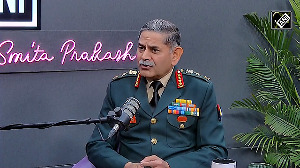Why has the Indian embassy in Kabul been attacked now, when India and Pakistan are on the verge of resuming their dialogue? Who is behind the attack? India has not named anyone. Pakistan has also condemned it.
It is too early to say who is behind the attack but whoever has done it wants to kill two birds with one stone: Foul up relations between Afghanistan and Pakistan as well as between India and Pakistan. If it is the Taliban, they have lost their way. There are elements in the Afghanistan government that are opposed to Pakistan. My guess is that these elements could have engineered the blasts to create fissures in the Afghanistan-Pakistan relationship and damage Pakistan's relations with India.
Either way, the net loss is Pakistan's because it will get maligned. Everyone has condemned the attack. It has not done any good to anyone. It has been engineered by the enemies of normal relations between India and Pakistan.
The US' strategic review of Afghanistan has suggested two options: Invest and Endure or Improve and Exit. There is also a suggestion that around 2013, just before the US elections, conditions may be created for a takeover of the government by the Taliban. What is your sense?
Let's look at the background of the Taliban in Afghanistan. Afghanistan has been under foreign occupation of one or the other kind for decades. There are groups there that have been against Pakistan for the last 30 years. When the Soviets were in Afghanistan and Pakistan gave extensive training to Mujahideen fighters across the border, there were some who didn't like Pakistan and said you gave training to so-and-so and not to so-and-so, you ignored us during jihad. There are deeply entrenched interest groups there.
But the Inter Services Intelligence and Pakistan will gain nothing by using these groups against India. In any case, if anyone has the impression that they are going to make Indians pack up and leave by attacks like these, they are making a big mistake. When you have a country as big as India, things like these can't deter it. But we have to consider what causes attacks like these. Unless we address the basic issues in Afghan politics and society, these problems will not go away.
The bottom line is that as long as US and NATO (North Atlantic Treaty Organisation) forces are in Afghanistan, there will be more attacks. Presence of more troops will mean more visible and extensive attacks because there will be more assets to target.
But so long as the Taliban and the Al Qaeda are present, how can the US and NATO pull out?
First of all, we have to understand that the Taliban and the Al Qaeda have totally different targets; and also that the Afghan Taliban are different from the Pakistan Taliban and there is evidence of this.
Let me explain. We can do business with the Taliban and in order to bring back some normalcy in Afghanistan, the Taliban and the US will have to do business. But we need to have some benchmarks for the conduct of the Taliban government before we do that. These benchmarks have to be set up by a contact group comprising countries like Russia, China, Iran, Pakistan and India. A United Nations Peacekeeping Force has to replace US and NATO forces till the Afghans are able to raise their own force.
You mentioned the differences between the Afghan and the Pakistan Taliban.
Yes, they are different not only because their structure is different but also because their objectives are different. The objective of the Afghan Taliban is to get the forces of occupation out of their country. The Pakistan Taliban are pitted not just against the security forces there but also against all those that support the war against terror. And then there is the Pakistani army in tribal areas.
We know that the Afghan Taliban have been telling the Pakistan Taliban not to attack government forces and installations. But the Pakistani Taliban have not heeded to this advice. The entire Afghan Taliban is united under the leadership of one man: Mullah Omar. Yes, there are small groups like the Hizb-e-Islami, but they are not recognised as the Taliban really because 40 of them are now members of Parliament. As far as fighting is concerned, the Hizb Islami are out of it.
But in tribal areas, in Swat and Malakand, the nature of the Taliban is totally different. The Pakistani Taliban are dominated by three powerful commanders - Baitullah Mehsud and his family, Hafiz Gul Bahadur, and Maulavi Nazir - based in North and South Waziristan, the hub of insurgent activity in Pakistan's tribal border regions. These three have often clashed among themselves.
Mullah Omar dispatched a six-member team to Waziristan in late December and early January. The Afghan Taliban delegation urged the Pakistani Taliban leaders to settle their internal differences, scale down their activities in Pakistan and help counter the planned increase of American forces in Afghanistan.
The three Pakistani Taliban leaders agreed. In February, they formed a united council, or shura, called the Council of United Mujahedeen. In a printed statement, the leaders vowed to put aside their disputes and focus on fighting the American-led forces in Afghanistan. But the Pakistan Taliban continue to be split. In Swat, their objective is to impose the Shariat law. In Malakand, Bajaur and Aurakzai provinces, the objectives of the Taliban are different. They have nothing to do with the Afghan Taliban.
So, what about the US allegation that some border provinces of Pakistan are used to give safe haven to Afghanistan Taliban?
There is no country that will benefit from peace and stability in Afghanistan as much as Pakistan. There is no country that is being as harmed by the insurgency in Afghanistan as Pakistan. But when you have a situation where US drones keep knocking out civilians, and if civilians apprehend they are going to be bombed, there will be some cross-border cooperation. Some Taliban leaders do cross the border. But not that many.
The fear is that if the US leaves Afghanistan without creating alternative political structures, you may have a situation like in 2001 when the Taliban were on the verge of coming to power. Since 2001, there has never been any chance of their returning to power. The Afghan people are not Taliban. But yes, there is a national liberation struggle on in Afghanistan against forces of occupation. And even ordinary Afghans have risen up against them.
How do suicide bombers killing civilians help a national liberation struggle?
That is their way.
How do you see the way ahead?
Unless the US begins negotiations with the Taliban on the premise that Afghanistan will never be a safe haven for the Al Qaeda, there can be no solution. Otherwise, there will be no end to human suffering in this part of the world.









 © 2025
© 2025